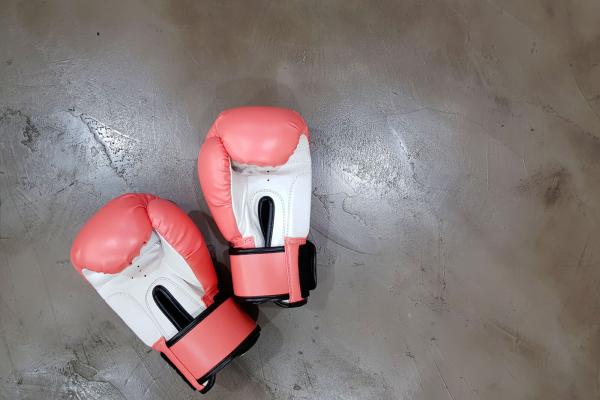NEO-NAZIS AND WHITE SUPREMACISTS are marching again. Counterprotesters are opposing and disrupting. Where do Christians stand? In April, Sojourners senior associate editor Rose Marie Berger launched this question on social media: Is it okay for a Christian to punch a Nazi? A lively conversation followed, eventually generating nearly 100 replies—and about as many different understandings (and misunderstandings) of Christian nonviolence. Excerpts from the conversation below are edited and used with permission. —The Editors
Rose: Is it okay for a Christian to punch a Nazi? Discuss.
Maureen: Last time I checked it is not okay to punch anyone, no matter who you are. Right?
Nate: Yes. Pacifism doesn’t work against genocide. You have to have an opponent who can feel shame. Nazis call for the extinction of my people and have proven they are willing to try and carry that out.
Rose: Is pacifism the same as organized unarmed resistance?
Nate: In my head it has the same results against Nazis. Nazis are my only punching exception.
Larry: Ask Dietrich Bonhoeffer ...
Nate: Show me where Bonhoeffer succeeded in stopping the Nazis. I’ll wait.
Larry: He didn’t, but he didn’t resist passively.
Korla: Choosing to accept death for yourself is substantially different from choosing to accept it for other people, particularly from a position where you’re incredibly low on the list of targets. That’s cowardly and colonial.
Maria: Depends on your goals. Pure individual self-defense? Probably. Winning a street battle? Maybe, but not certain. Therapeutic release? Yeah, perhaps. Winning the strategic game of dismantling white supremacy? Probably not, since over time it will discourage participation and weaken the political jujitsu effect. Maintaining nonviolent discipline has nothing to do with white privilege and everything to do with strategic efficacy. Also, self-expression and exhibitionism (which is often what punching is about) is hardly the same thing as organizing and winning. I’d probably focus on the latter.
James: Nonviolence is not an adequate form of resistance against forces that advocate violence to achieve their means; nonviolence only makes the resisters easier targets, and martyrdom doesn’t accomplish much in the short term. The only way to meet Nazis’ evil violence is with righteous violence—but that doesn’t mean it’s okay just to walk up and punch somebody who’s simply advocating reprehensible ideas. Until the Nazis start using their cudgels, it’s better just to yell at them.
Theodosius: There is no such thing as righteous violence any more than there is a just war. Both are wrong and against God, and what Satan wants from us.
James: Well, that argument has no force in secular society.
Chuck: And therefore? For the most part, the story of the cross is weakness and foolishness to secular society, but is the very power of God made manifest.
Jasper: My gut reaction is that Christian pacifism is relatively unconcerned with earthly outcomes. It’s a personal decision to participate in the suffering of Christ regardless of how effective that decision is against injustice, because to do so is ultimately to join in a greater sort of victory. Resisting the evil of violence is more important than resisting the evil afoot in the world. Organized unarmed resistance takes its particular form because it believes it will be effective against injustice. Fidelity to Jesus’ love command and the biblical precedent of social justice is of primary importance, not necessarily compassion or suffering-with. The actions of those engaged in both may be similar, but motivations differ—not all nonviolent resisters are necessarily pacifists.
Theodosius: So how did the early Christian act about the violence directed at them? Did they not march to their deaths singing praises to their Lord and crying for forgiveness for those about to kill them? Were they fools to do that?
Chuck: They were not. But without more context, the original question is nigh impossible to answer. I generally think of it like this: Striking another is always sinful, but in some cases it might be the least sinful thing to do. But I’m thinking that we must remind ourselves of our own brokenness, which causes us often to rightly read the context.
Debbie: In self-defense or defense of another: Yes!
Theodosius: No. You stand in the way and take what is being directed at the other person.
Joey: Considering it from a position of nonviolence, I don’t even think it’s fair to call such acts “violence” when you consider the vast scope of violence of the dominant systems of oppression. Punching a Nazi does extremely little harm to that Nazi compared to the harm done by the ideologies they espouse. Therefore, even calling those acts “violence” is spitting in the face of people oppressed by white supremacy and patriarchy.
Marc: That’s just wrong, because the definition of the term is lost in the application. You can argue for punching Nazis, but not as nonviolence. It makes no sense. Nonviolence is about the means as ends, by definition.
Jackie: Are you punching them while they are in the act of doing something awful? Or simply because they are a Nazi? I think that matters.
Ryan: If your right fist causes you to sin, cut it off. Then throw it at the Nazi. Then give them a left hook.
Mark: I’m personally more concerned with whether or not it is helpful to punch a Nazi at this point, not whether or not it is right or okay. I think the assumption that a Nazi-punch is effective or productive needs to be interrogated. Often it seems like a machismo release rather than tactically valuable, and the conversation gets stuck on the morality of violence vs. nonviolence rather than on tactical considerations. Personally, I don’t think it is usually all that helpful. I think there are probably better tactics. In terms of morality, I don’t get upset if some Nazi gets clocked. That’s not the sort of violence that worries me. At the same time, I can’t imagine personally punching Nazis in any way that actually benefits my development as a whole person.
Marcia: It’s okay to restrain them if they are punching someone else, to blockade them if they are intent on evil, to protest them when they rally, and to pray for their conversion at all times. It is even okay to heal them and bind their wounds when they are punched by someone else (I’m thinking of Charlottesville). But if we punch a Nazi, then they win. Their gospel is violence, and when we embrace their example, then we abandon the nonviolent gospel of Jesus Christ, who tells us to love not just our neighbor but our enemies as well. Or, as Dorothy Day put it, “Love is the only solution.”
Korla: So yes, their gospel is violence. But it is not an abstract violence. It is violence with quantifiable goals. If punching a Nazi interrupts them in the pursuit of those goals, that doesn’t mean they win.
Randall: In self-defense, it is sometimes necessary to be proactive before a threat grows to the capacity to do you, your family, your community, or your nation harm. Therefore, although I am not a big fan of the antifa movement, I must admit that they have done a remarkable job at discouraging, bringing attention to, and making fools of Nazis and their rallies.
If our government fails to take the steps necessary to stop Nazi terrorism in the United States, fails to protect victims and targets of fascist “alt-right” attacks, the least people can do is punch them in the face and expose them as the racist cowards they are. However, actions must be well calculated to avoid escalation, and most of the emphasis needs to be on massive nonviolent direct action, including the strategy of identifying and exposing Nazis and other members of racist, nationalist militias.
Nate: Nazis. The people who tried to exterminate my people. Nazis should be punched. I’m not for violence in many other circumstances. But history has taught violence is the only defense against specifically Nazis.
Theodosius: God creates all of us as true icons of Christ. That means that the person you would strike out at is in fact Christ himself. Now, stop your ego and discover the real truth of how others faced and fought the Nazis. Not by guns, but rather by prayer. And by acting as Christ.
Susan: I am increasingly compelled to consider how much my nonviolence values are a luxury of my white privilege.
Diane: No. Would Jesus punch a Nazi? There are other ways to fight evil. Self-defense would allow a person to punch another, but that doesn’t really have anything to do with who the two people are.
Kate: I taught a class on just war theory and pacifism today and am finding this to be a fascinating thread. One interesting question is about the role of nonviolence in solidarity. Measuring U.S. (civilian) solidarity with the Sandinistas, for example, against solidarity with the second intifada. When, where, and why is nonviolence a prerequisite for solidarity, and when, where, and why is it not?
Bill: Was World War II a “just war”? Does nonviolent resistance only work against the “civilized” British or Americans, but not against Nazis? It’s only our failure to imagine and practice new nonviolent tactics in such situations that makes this question serious.
David: It brings to mind the old question, “What would Jesus do?” Would Jesus punch a Nazi? If he accepted being tortured and executed without violent resistance, what would compel him to react differently to 20th and 21st century oppressors?
Phil: The correct question is, “Is it okay for a Christian to do nothing toward a Nazi?” This is an astronomically more important question.

Got something to say about what you're reading? We value your feedback!
